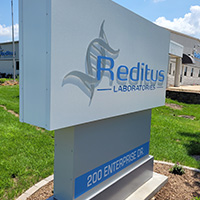Reditus Technologist Hopes to Inspire Future Scientists
PEKIN, IL – When the lead medical laboratory technologist at Reditus Laboratories spoke recently to the Illinois Heartland Section of the American Chemical Society (ACS), her goal was nothing less than inspiring a new generation of scientists.

“My personal goal is to share my passion for science and hopefully inspire new members and future scientists,” said Karina Champion.
Champion spoke during the March 18 meeting, conducted via Zoom. While the Heartland Section of the ACS is made up mostly of chemistry professors from Central Illinois colleges, some other science teachers and chemistry graduate students also listened to the presentation.
“I hope to inspire some of them to become medical lab professionals,” Champion said.
Champion joined Reditus in May 2020. Prior to that, she was a chemistry lecturer at Bradley University and an adjunct faculty member at Illinois Central College.
The Heartland Section of the ACS generally meets monthly and Champion, the Heartland Section’s secretary, was invited to speak. Michael Stewart, a medical laboratory technologist at Reditus, assisted Champion in preparing the presentation.
Her presentation – entitled “Real Time Polymerase Chain Reaction (RT-PCR) Diagnostic Testing for SARS-CoV-2 at Reditus Laboratories” — included a discussion of the characteristics of SARS-CoV-2 (COVID-19); the scientific principles behind PCR testing; an explanation of PCR testing, including the procedure, instruments and reagents used; and interpretation of results and reporting.
Champion’s summary of her presentation follows:
“The high throughput workflow used to detect the presence of SARS-CoV-2 targets (S gene, N gene and ORF1ab) in nasopharyngeal swabs consists of two steps: purification of targets, followed by a multiplex quantitative Real Time Polymerase Chain Reaction (RT-PCR). The initial separation of RNA targets is automated and uses magnetic beads. The isolated RNA targets are then amplified up to a million-fold in forty RT-PCR cycles. The viral RNA content is quantified after each cycle via fluorescent dyes. A specimen with high concentration of viral targets shows amplification at early cycles, while a specimen with low concentration of sequences shows amplification at latter cycles.”
Discussing the testing process is timely and Champion hopes her presentation will improve understanding about and trust in the testing process at Reditus.
“In the last year, my admiration for science grew because I am aware that scientists have been working around the clock to develop and implement tests, vaccines and possible cures to save everyone from the effects of SARS-CoV-2,” Champion said. “I am proud to be a small part of the solution at Reditus. I know that what my colleagues and I do has an impact in our community and I am proud about it.”
“I hope this will inspire graduate students to find new protocols to diagnose other diseases,” Champion said.
By Paul Swiech
###
Reditus Laboratories is a full-service laboratory company with a heavy focus on molecular diagnostics. Based in Pekin, Illinois, Reditus provides top-tier, accurate anatomical and clinical pathology services, including cytology, histology and molecular testing. Reditus is accredited by the College of American Pathologists (CAP) and is certified by the Clinical Laboratory Improvement Amendments (CLIA) program. Additional information is at www.redituslabs.com, as well as on Facebook at Reditus Laboratories and Twitter @ReditusLabs.








